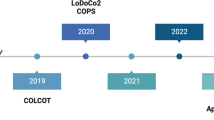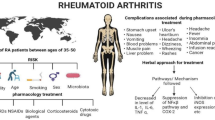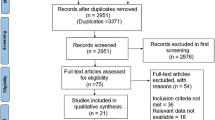Summary
Cardiovascular (CV) disease is increased in patients with chronic inflammatory disease, including rheumatoid arthritis (RA). Furthermore it has become clear at a pathophysiological level, that atherosclerosis has striking similarities with autoimmune disease. This realization has come at a time of paradigm shift in how rheumatologists manage RA, with the availability of biological agents targeting key inflammatory cytokines. This review will focus on the possible causes of increased vascular disease in RA, including the role of traditional CV risk factors. Mechanisms potentially at play, such as C-reactive protein (CRP), altered coagulation, and cyclooxygenase (COX)-2 inhibitors will be covered in brief. The receptor for advanced glycation end products (RAGE) has been identified as a candidate molecule influencing response to ongoing inflammation and autoimmunity. There will be a focus on the role of RAGE in CV disease and RA. As has been the case with many novel molecules, functional polymorphisms are thought to alter disease expression and assist us in coming to terms with the biological activities of the parent molecule. The review will conclude with a discussion of the potential role of the RAGE Glycine 82 Serine polymorphism.
Zusammenfassung
Kardiovaskuläre Erkrankungen treten bei Patienten mit chronischen entzündlichen Erkrankungen wie zum Beispiel der rheumatoiden Arthritis (RA) gehäuft auf. Aus der Sicht der Pathophysiologie hat die Atherosklerose mit Autoimmunerkrankungen verblüffende Ähnlichkeiten. Diese Erkenntnis wurde zu einer Zeit des Paradigmenwechsels im Management der chronischen Polyarthritis mit Biologika gemacht. Diese Übersicht beschreibt mögliche Ursachen für das gehäufte Auftreten von Gefäßerkrankungen der Rheumatoiden Arthritis einschließlich der Rolle von traditionellen kardiovaskulären Risikofaktoren. Potentielle Mechanismen wie das C-Reaktive Protein (CRP), Veränderungen im Gerinnungssystem und Cyclooxygenase-(COX-)2-Inhibitoren werden kurz behandelt. Der Advanced Glycation End Product Receptor (RAGE) wurde als Kandidatenmolekül, welches laufende Entzündungen und Autoimmunprozesse beeinflusst, identifiziert. Ein Schwerpunkt dieser Übersichtsarbeit ist die Rolle von RAGE bei kardiovaskulären Erkrankungen und der chronischen Polyarthritis. Wie es bei vielen neuen Molekülen der Fall ist, wird angenommen, dass funktionelle Polymorphismen die Krankheitsexpression verändern und zur Aufklärung der biologischen Aktivitäten des ursprünglichen Moleküls beitragen können. Diese Übersichtsarbeit schließt mit einer Diskussion der möglichen Rolle des RAGE Glycine 82 Serine Polymorphismus.
Similar content being viewed by others
Author information
Authors and Affiliations
Corresponding author
Rights and permissions
About this article
Cite this article
Carroll, L., Hannawi, S., Marwick, T. et al. Rheumatoid arthritis: links with cardiovascular disease and the receptor for advanced glycation end products. Wien Med Wochenschr 156, 42–52 (2006). https://doi.org/10.1007/s10354-005-0242-9
Issue Date:
DOI: https://doi.org/10.1007/s10354-005-0242-9
Keywords
- Rheumatoid Arthritis
- Cardiovascular diseases
- Advanced glycation end product receptor
- Polymorphism
- Genetics
- Inflammation
- C-reactive protein
- Hyperlipidaemia
- Coagulation




